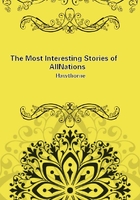The simple procedure, or rather the absence of all formal procedure, at the Assemblies, illustrates admirably the essentially practical character of the institution. The meetings are held in the open air, because in the village there is no building--except the church, which can be used only for religious purposes--large enough to contain all the members; and they almost always take place on Sundays or holidays, when the peasants have plenty of leisure. Any open space may serve as a Forum. The discussions are occasionally very animated, but there is rarely any attempt at speech-making. If any young member should show an inclination to indulge in oratory, he is sure to be unceremoniously interrupted by some of the older members, who have never any sympathy with fine talking. The assemblage has the appearance of a crowd of people who have accidentally come together and are discussing in little groups subjects of local interest. Gradually some one group, containing two or three peasants who have more moral influence than their fellows, attracts the others, and the discussion becomes general. Two or more peasants may speak at a time, and interrupt each other freely--using plain, unvarnished language, not at all parliamentary--and the discussion may become a confused, unintelligible din; but at the moment when the spectator imagines that the consultation is about to be transformed into a free fight, the tumult spontaneously subsides, or perhaps a general roar of laughter announces that some one has been successfully hit by a strong argumentum ad hominem, or biting personal remark. In any case there is no danger of the disputants coming to blows. No class of men in the world are more good-natured and pacific than the Russian peasantry. When sober they never fight, and even when under the influence of alcohol they are more likely to be violently affectionate than disagreeably quarrelsome. If two of them take to drinking together, the probability is that in a few minutes, though they may never have seen each other before, they will be expressing in very strong terms their mutual regard and affection, confirming their words with an occasional friendly embrace.
Theoretically speaking, the Village Parliament has a Speaker, in the person of the Village Elder. The word Speaker is etymologically less objectionable than the term President, for the personage in question never sits down, but mingles in the crowd like the ordinary members. Objection may be taken to the word on the ground that the Elder speaks much less than many other members, but this may likewise be said of the Speaker of the House of Commons. Whatever we may call him, the Elder is officially the principal personage in the crowd, and wears the insignia of office in the form of a small medal suspended from his neck by a thin brass chain. His duties, however, are extremely light. To call to order those who interrupt the discussion is no part of his functions. If he calls an honourable member "Durak" (blockhead), or interrupts an orator with a laconic "Moltchi!" (hold your tongue!), he does so in virtue of no special prerogative, but simply in accordance with a time-honoured privilege, which is equally enjoyed by all present, and may be employed with impunity against himself. Indeed, it may be said in general that the phraseology and the procedure are not subjected to any strict rules. The Elder comes prominently forward only when it is necessary to take the sense of the meeting. On such occasions he may stand back a little from the crowd and say, "Well, orthodox, have you decided so?" and the crowd will probably shout, "Ladno!
ladno!" that is to say, "Agreed! agreed!"
Communal measures are generally carried in this way by acclamation;
but it sometimes happens that there is such a diversity of opinion that it is difficult to tell which of the two parties has a majority. In this case the Elder requests the one party to stand to the right and the other to the left. The two groups are then counted, and the minority submits, for no one ever dreams of opposing openly the will of the Mir.
During the reign of Nicholas I. an attempt was made to regulate by the written law the procedure of Village Assemblies amongst the peasantry of the State Domains, and among other reforms voting by ballot was introduced; but the new custom never struck root. The peasants did not regard with favour the new method, and persisted in calling it, contemptuously, "playing at marbles." Here, again, we have one of those wonderful and apparently anomalous facts which frequently meet the student of Russian affairs: the Emperor Nicholas I., the incarnation of autocracy and the champion of the Reactionary Party throughout Europe, forces the ballot-box, the ingenious invention of extreme radicals, on several millions of his subjects!
In the northern provinces, where a considerable portion of the male population is always absent, the Village Assembly generally includes a good many female members. These are women who, on account of the absence or death of their husbands, happen to be for the moment Heads of Households. As such they are entitled to be present, and their right to take part in the deliberations is never called in question. In matters affecting the general welfare of the Commune they rarely speak, and if they do venture to enounce an opinion on such occasions they have little chance of commanding attention, for the Russian peasantry are as yet little imbued with the modern doctrines of female equality, and express their opinion of female intelligence by the homely adage: "The hair is long, but the mind is short." According to one proverb, seven women have collectively but one soul, and, according to a still more ungallant popular saying, women have no souls at all, but only a vapour.















